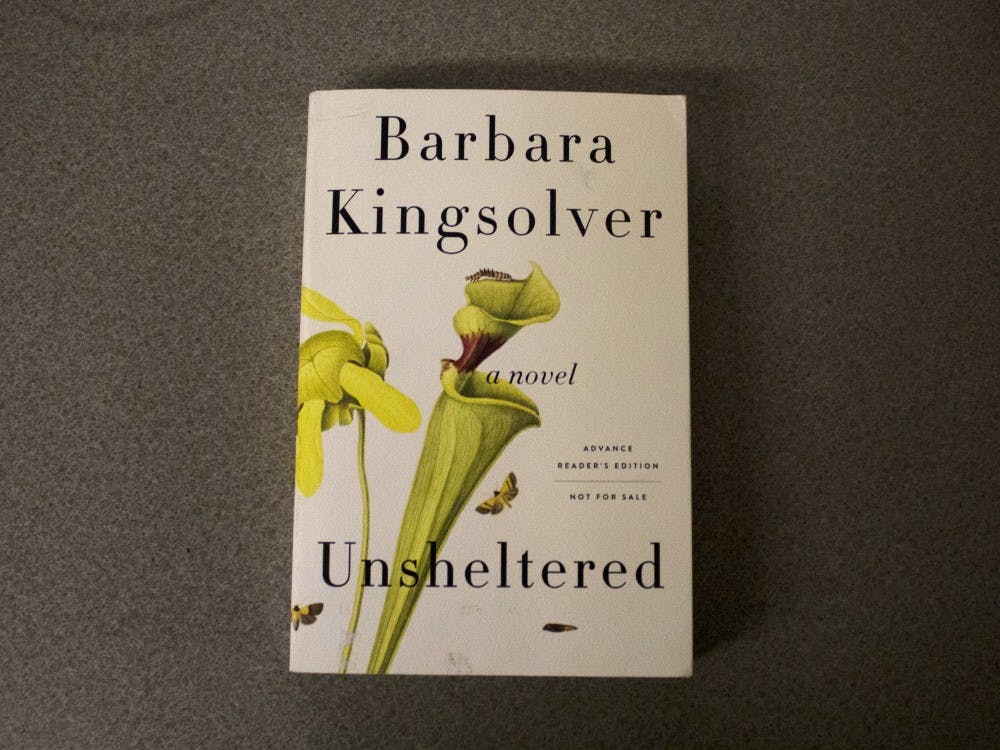To talk about climate change, the Trump administration and American capitalism, Barbara Kingsolver takes it back to the '70s. The 1870s.
“Unsheltered” follows the interweaving narrative of two families — a modern and a Victorian family — through historical periods of great flux.
The modern storyline follows Willa and her husband, Iano, who have concurrently lost their jobs and move to a dilapidated house in Vineland, New Jersey. Iano brings his racist, dying father to live with them, and their children — a poverty-stricken Harvard graduate and a daughter who recently returned from a hiatus in Cuba — ushering along conflicts, undesired children and death.
Willa’s crushing desperation to make sense of her jobless, nearly houseless and responsibility-shouldering life lend extreme weight to her situation and make her the load-bearing focus of the overall narrative.
As anticipated with Kingsolver, “Unsheltered” is fiercely political, and the characters are immensely interesting. Familial relationships bud with warmth and humanity, but also bristle with tension.
The novel explores political beliefs in tense conversations between family members, but also in the world around them, as Donald Trump (who is never referred to explicitly) begins winning primaries and gaining clout.
Willa’s son and daughter often argue about economic ethics and environmental responsibility, among other things. Through these relationships, Kingsolver unravels a thread of desperation. No one is really sure who is “right,” all the while these global situations continues to cause direct problems in their lives — poverty, for example.
In an effort to finance the rescue of her crumbling home through government grants, Willa discovers the story of Mary Treat, a real-life figure and underappreciated scientist, and Thatcher Greenwood, who was a friend of Charles Darwin in the late 19th century.
The 1870s narrative follows Thatcher and Treat in their conflicts teaching Darwinism in Vineland’s religious public school system. Thatcher becomes the champion for progressive science when he is pitched against his religious boss, Mr. Cutler. The two struggle for ethos and power in the Vineland classrooms, to the point the school decides to hold a debate-showdown, hilariously titled “Darwinism versus Decency.”
Even in this unfamiliar, distant setting, the novel’s entire cast proves to be a fleshed out, spirited collection of personalities. The reader’s first sees Victorian-era Treat through a window as she lies face down in her yard, counting ants. The second time the reader sees her, she’s letting a Venus flytrap bite her finger to test its digestive capabilities.
Greenwood’s story is just as compelling, and embodies the novel’s thematic search for truth in the face of change and uncertainty. What could have been a dated, unfamiliar narrative of centuries past is startlingly modern in its implications.
Kingsolver is interested in the ethics of late capitalism and how science fares with religion. But what interests her more is a broader understanding of human endurance in the face of change and how communities deal with doubt — or being “unsheltered.”
Kingsolver’s writing is witty and delightful, her strong and pointed characters are gripping. Her delicate and marvelous exploration of these issues can find multiple contact points with anyone on the political spectrum.
Both narratives take place in a world undergoing dramatic social change, and both follow characters caught in the midst of them.



